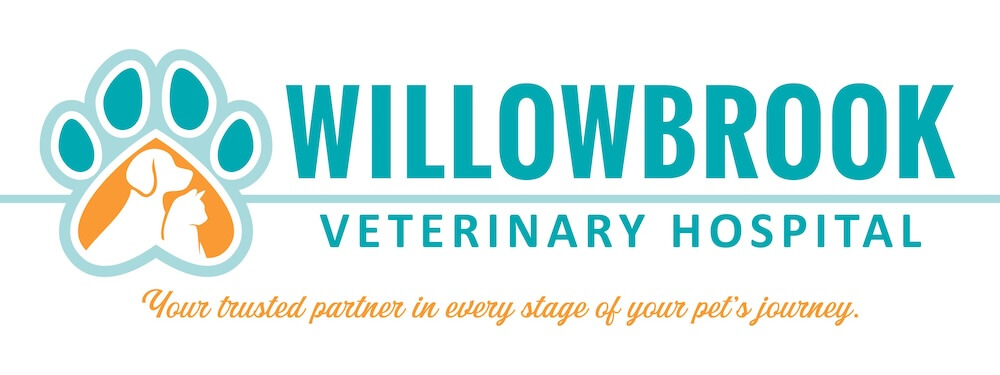Dog Nutrition & Diet Counseling
At Willowbrook Veterinary Hospital, we know that what your dog eats plays a crucial role in their overall health, from puppyhood through their senior years.
How Do I Know What Diet Is Best for My Dog?
The best diet for your dog depends on their age, breed, activity level, health status, and lifestyle. We’ll help you navigate the many options available, from commercial brands to prescription formulas, to ensure your dog gets balanced, complete nutrition.
How Important Is Nutrition for Dogs?
Nutrition is the foundation of your dog’s health. It affects:
- Growth and development
- Immune function
- Joint and muscle strength
- Skin and coat quality
- Energy levels
- Digestive health
- Risk of chronic disease and obesity
Do My Dog’s Nutrition Needs Change With Age?
Absolutely. Dogs require different nutrients and feeding strategies throughout their life stages:
- Puppies need energy-rich diets with the right balance for growth
- Adults benefit from maintenance formulas to support activity and metabolic needs
- Seniors may require fewer calories, more fiber, or kidney/liver support
We’re here to guide you through every transition.
What Nutrients Does My Dog Need?
A balanced diet should contain:
- Proteins – For muscle development and repair
- Fats – For energy, brain function, and coat health
- Carbohydrates – For digestible energy and fiber
- Vitamins and minerals – To support bone health, metabolism, and immunity
What Affects My Dog’s Nutritional Needs?
Your dog’s nutrition should be customized based on:
- Age and life stage
- Breed and size
- Activity level
- Medical conditions or medications
- Reproductive status (e.g., pregnant or neutered)
Signs Your Dog’s Diet Might Not Be Meeting Their Needs
Watch for:
- Dull coat or flaky skin
- Weight loss or gain
- Low energy
- Poor muscle tone
- Loose or irregular stool
- Increased shedding
These may signal nutritional imbalance or underlying health issues.
Will My Dog Ever Need Supplements?
In most cases, a complete and balanced diet provides everything your dog needs. We may recommend supplements if your dog has specific deficiencies, joint concerns, or digestive issues—but only after evaluating their full health picture.
What Should I Look for on a Dog Food Label?
Check for:
- An AAFCO statement confirming the food is complete and balanced for your dog’s life stage
- A named protein source (like chicken or beef) as the first ingredient
- Clear feeding guidelines
- Avoid foods with vague ingredients or unproven marketing claims.
Are Grains Bad for Dogs?
No. In fact, grains are a safe, healthy source of nutrition for most dogs. The grain-free trend has been linked to cases of nutritional DCM, a potentially deadly heart condition.
We do not recommend grain-free diets unless medically necessary and prescribed.
Are Byproducts Dangerous?
Not at all. When properly sourced, byproducts (like organ meats) are highly nutritious and naturally rich in vitamins and minerals. They are often more nutrient-dense than muscle meat alone.
Is a Raw Diet Safe?
Raw diets carry risks, including bacterial contamination, nutritional imbalances, and harmful bones or additives. It can also be a potential source of H5N1 (Avian Influenza) transmission. We don’t recommend raw diets unless under the strict guidance of a veterinary nutritionist.
Is Homemade Dog Food Better?
Not necessarily. Homemade food can be healthy when properly formulated, but most recipes found online are unbalanced. If you want to cook for your dog, we’ll help you work with a board-certified veterinary nutritionist to ensure your dog’s needs are met.
How Often Should I Feed My Dog?
Most adult dogs do well with two meals per day. Puppies may need to eat 3–4 times a day, and seniors or special-needs dogs may require more specific routines.
Am I Feeding My Dog Too Much or Too Little?
Weight gain, sluggishness, or leftover food may indicate overfeeding. Weight loss or always seeming hungry may suggest underfeeding. Regular weigh-ins and body condition scoring during wellness visits help us fine-tune feeding recommendations.
When Would My Dog Need a Prescription Diet?
Prescription diets are formulated for specific medical conditions, such as:
- Kidney or liver disease
- Allergies or gastrointestinal issues
- Diabetes or urinary problems
- Weight management
We’ll prescribe one only if your dog truly needs it, and we’ll support you in transitioning safely.
How Can I Prevent Obesity in My Dog?
- Measure food portions
- Limit treats and table scraps
- Provide regular exercise
- Schedule regular weight checks
Obesity can lead to joint pain, diabetes, and reduced lifespan—prevention is key.
What About Treats? Do They Matter?
Yes! Treats should make up no more than 10% of your dog’s daily calories. Choose options with recognizable ingredients and nutritional value. We’re happy to recommend vet-approved options.
Our veterinarians are certified in pet nutrition and work closely with every client to develop safe, science-based feeding plans tailored to your dog’s unique needs. We do not recommend grain-free diets due to the established link to nutritional dilated cardiomyopathy (DCM) and support evidence-based nutrition from reputable veterinary sources.
Have questions about your dog’s diet or ready to schedule a nutrition consult? We’re here to help.
If you have questions, we would love to answer them for you. Please give us a call at the office at (503) 968-2911, or you can email us at [email protected]. Our staff would love to talk with you!
